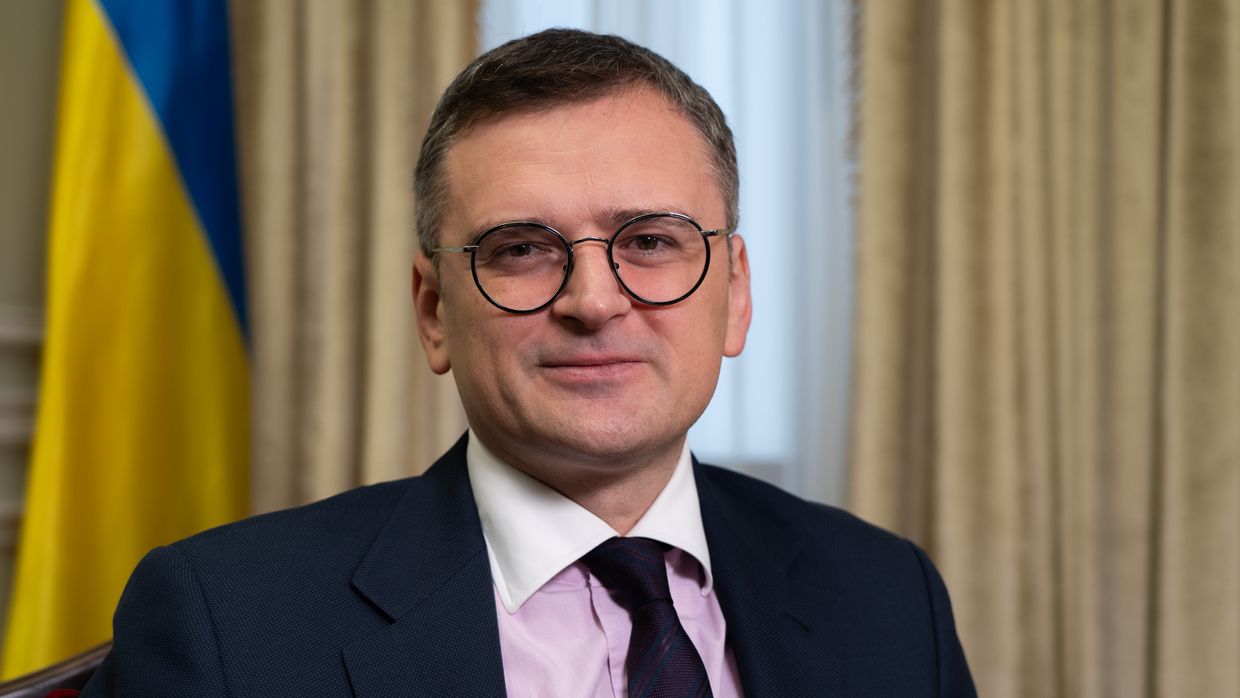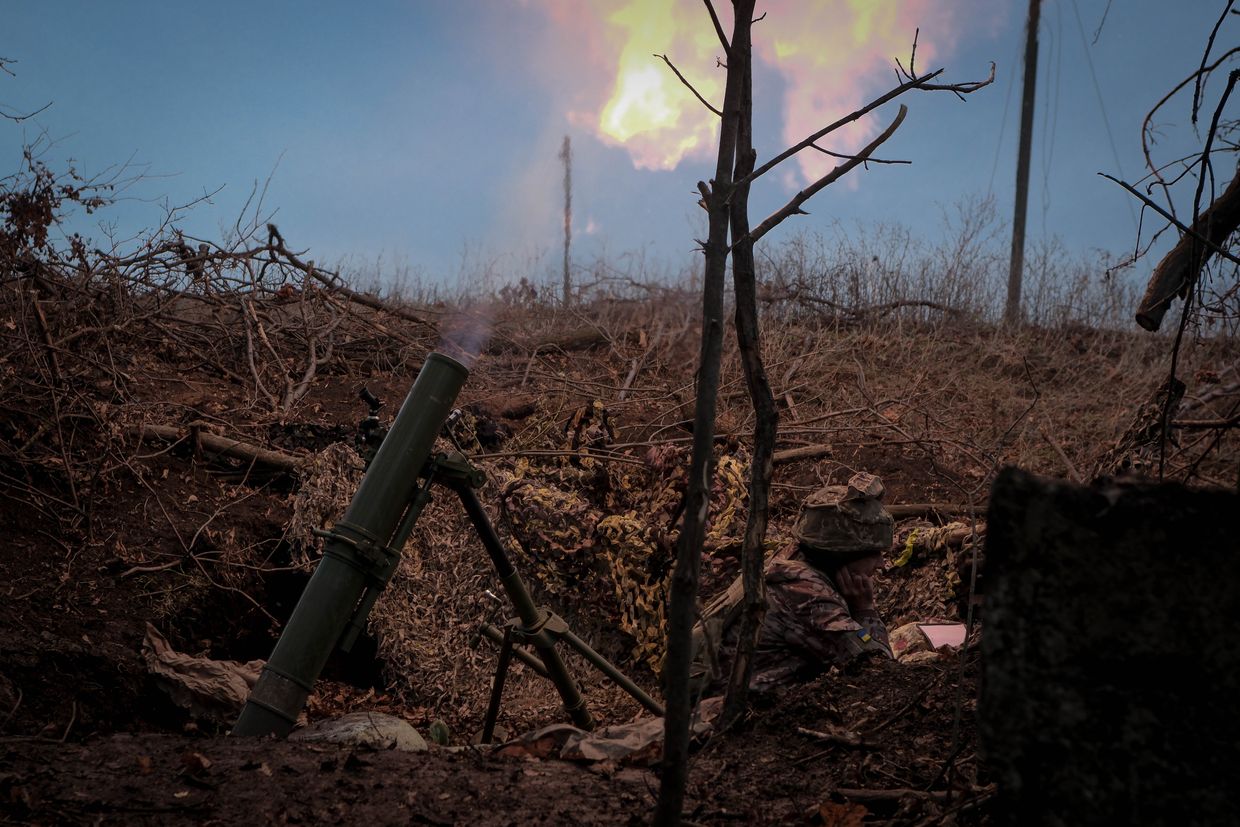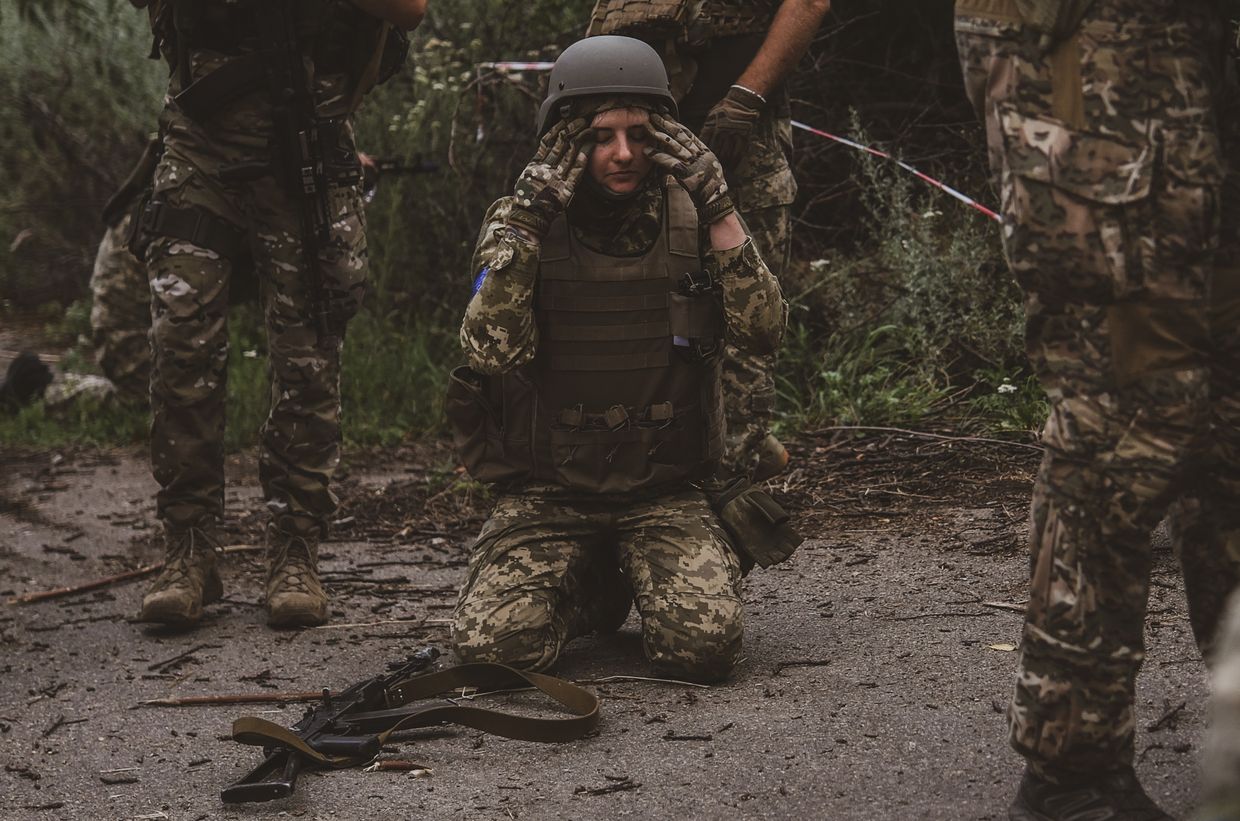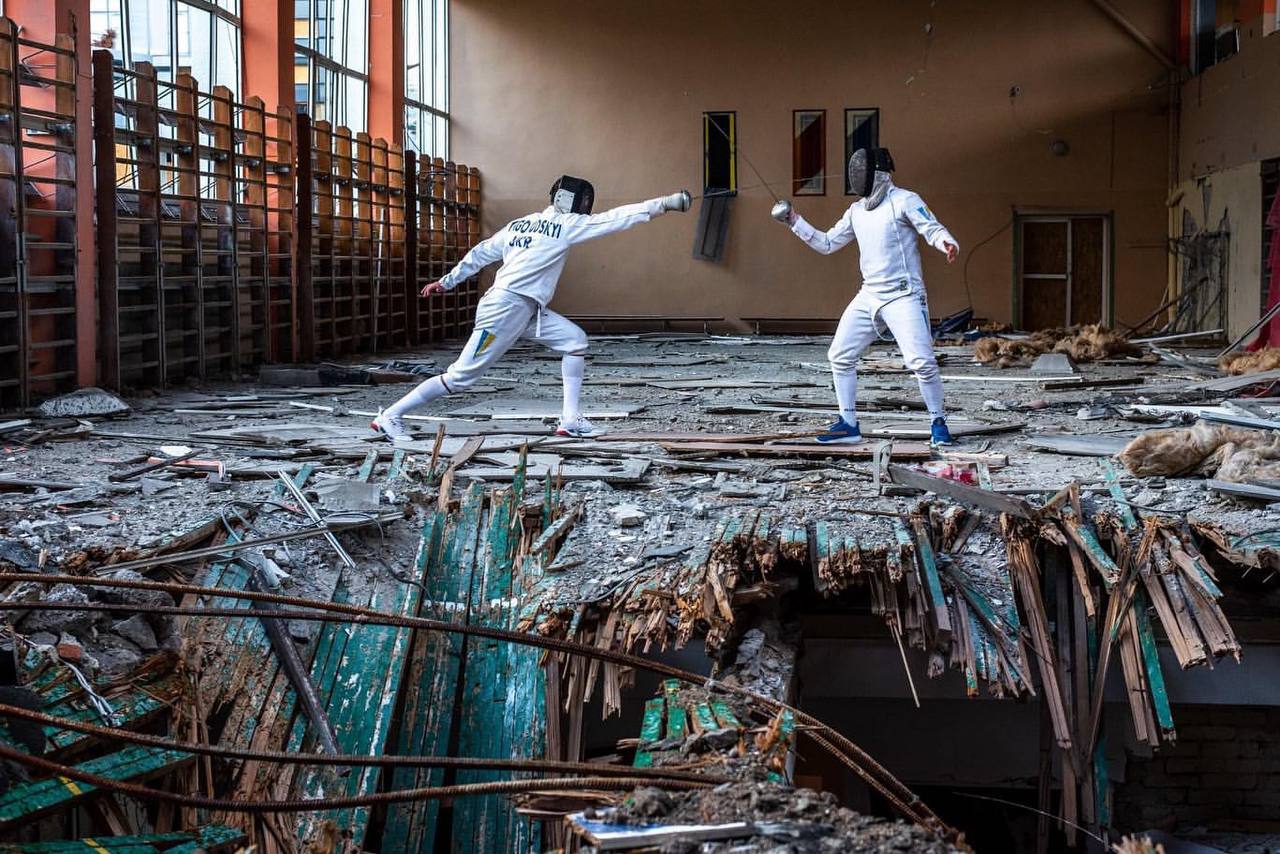Ukraine war latest: Military says Russia trying to bypass Avdiivka, avoid fighting within city

Key updates on Dec. 27:
- Military: Russia trying to bypass Avdiivka, avoid fighting within city
- Economy minister warns of delays to salaries, pensions if Western aid stops
- Defense Ministry approves first body armor for female soldiers
- Official: Russia's full-scale invasion has killed over 400 Ukrainian athletes
- Military: 465 documented cases of Russia using chemical weapons in Ukraine since Feb 24, 2022
- Politico: Russia attempting to use Ukrainian POWs to foment unrest at home
Russian forces continue to attack Avdiivka in Donetsk Oblast but are trying to bypass the city, Oleksandr Tarnavskyi, head of the Tavria group of Ukraine's military fighting on the southeastern front lines, said in an interview with BBC Ukraine published on Dec. 27.
Russia intensified its attacks against Avdiivka in early October, reportedly suffering heavy losses in an attempt to encircle the front-line town just kilometers from the occupied city of Donetsk.
Ukrainian forces have continued to defend the now-destroyed town and prevent Russia from securing significant gains.
Avdiivka remains a primary direction of Russian attacks in the area, Tarnavskyi said, but Russian forces likely want to avoid actually entering the city and engaging in the type of brutal street combat that was seen in the battle for Bakhmut.
Russian forces eventually captured the city of Bakhmut in Donetsk Oblast after months of grueling urban combat in May 2023, suffering tens of thousands of casualties in the process. Fighting around Bakhmut has nonetheless continued.
Oleksandr Shtupun, the spokesman for the Tavria group of forces, said on Dec. 20 that Russian forces had advanced between 1.5 and two kilometers since the beginning of their renewed push against Avdiivka and lost as many as 20,000 killed and wounded.
Tarnavskyi added that his forces operating in the southeast sector of the country continue to take offensive actions and refuted the notion that Ukrainian actions have switched to a primarily defensive nature.
Russian state-owned media RIA Novosti reported on Dec. 25 that Russian Defense Minister Sergei Shoigu had declared the complete capture of Marinka, another suburb of Donetsk located around 30 kilometers southwest of Avdiivka.
Shtupun denied Shoigu's claim, saying that Marinka had been completely destroyed, but fighting to control the area continued. Ukraine’s Commander-in-Chief Valerii Zaluzhnyi said on Dec. 26 that Ukrainian troops remained in Marinka’s northern part.
Tarnavskyi predicted that 2024 may be an even more difficult year for Ukraine than 2023 and said there is a current lack of resources, both human and technical.
Soldiers should be rotated out, he said, adding that the army needs more men and equipment.
"We must end hostilities and liberate our territories. And the closer we get to accomplishing this task, the main goal of reaching our borders, it will be even more difficult. The enemy knows about this and will do everything to prevent us from accomplishing this task."
Economy Minister warns of delays to salaries, pensions if Western aid stops
Ukraine may have to prioritize spending on defense above paying salaries if the EU and U.S. do not approve more aid soon, Deputy Prime Minister and Economy Minister Yuliia Svyrydenko said in an interview with the Financial Times on Dec. 27.
Congress has been unable to pass a $61 billion funding package for Ukraine amid months of infighting, while Hungary vetoed a four-year EU funding package for Ukraine worth $55 billion at the European Council summit in mid-December.
"The support of partners is extremely critical," Svyrydenko told the Financial Times. "We need it urgently."
"There's a huge risk of underfunding of certain social sectors," including delaying wages paid to 500,000 civil servants and 1.4 million teachers.
Payments to 10 million pensioners would also be at risk if foreign aid stops, according to Svyrydenko.
Ukraine could manage for a few months by borrowing money or transferring funds from the central bank to the government, but that could "unleash inflation and undermine financial stability," the Financial Times wrote, citing Western officials.
An economic crisis could "derail Ukraine's economy and weaken its tax base, making the country even more dependent on foreign support," the newspaper said.
EU leaders were expected to reach a consensus on future financial assistance for Ukraine by the end of 2023, but Hungary refused to back the four-year funding package.
In an interview with the Kyiv Independent on Dec. 19, Ukrainian Foreign Minister Dmytro Kuleba said that the EU should approve financial aid for Ukraine within the next month.
"It's all in the hands of the European Union itself, but the timeline that we were given is by the end of January," Kuleba said.
The bloc is reportedly considering creating a debt-based plan worth up to 20 billion euros to fund Ukraine and sidestep Hungary's veto.
The White House hopes that Congress will pass a funding request containing $61 billion for Ukraine in January to maintain support for Kyiv.
Defense Ministry approves first body armor for female soldiers
Women serving in the Ukrainian military will be provided with specially designed body armor for the first time after Ukraine's Defense Ministry announced on Dec. 27 that it had certified a sample of bulletproof vests for female soldiers.
While Ukraine only conscripts men, over 62,000 women voluntarily serve in Ukraine's Armed Forces, 5,000 of whom have active combat roles.
They generally rely on uniforms and armor designed for men, buy their own gear, or find supplies via non-profits.
The newly approved vest features a curved armor plate and narrower shoulders to provide a better fit for female soldiers and is made domestically by the company Ukrainian Armor.
The company led a campaign in September to draw attention to the need for body armor for women serving in the Ukrainian military.
The weight of the armor, which is at least 10.5 kilograms, does not differ from other body armor in use.
According to the Defense Ministry, the vest was approved after two stages of testing. After the first stage of field tests, the design was refined to fit the female body better.
Certification is the first step in the process toward female soldiers being able to wear the vests in the combat zone.
The Defense Ministry said it must first ascertain how many vests are needed and then arrange procurement but did not indicate a timeline for this.
The Defense Ministry approved a standard sample of summer field uniforms for female soldiers in August, 18 months into the full-scale invasion.
Official: Russia's full-scale invasion has killed over 400 Ukrainian athletes
More than 400 Ukrainian athletes have been killed, and about 500 sports facilities have been damaged or destroyed since the beginning of Russia's full-scale invasion of Ukraine, Vadym Gutzeit, the head of Ukraine's National Olympic Committee, said on national television on Dec. 27.
Gutzeit, Ukraine's former Youth and Sports Minister, was responding to a question about the proposed participation of Russian athletes in the upcoming Olympic Games in Paris next year.
The International Olympic Committee (IOC) announced on Dec. 8 that Russian and Belarusian athletes would be allowed to compete as Individual Neutral Athletes (AIN) with "strict eligibility conditions."
Some in Russia have complained about the supposed unfairness of only being able to compete without the Russian flag, Gutzeit said. "We're losing people... Is that fair to us?" he added.
The decision was condemned by Ukraine's Foreign Ministry, as well as Ukrainian athletes and other officials. The foreign ministers of Estonia and Lithuania also criticized the move.
Gutzeit also said that the participation of Ukrainian athletes in the games was a very important symbol of the country's existence on the international stage.
He added all preparations were being made for Ukrainian athletes to train and be ready to compete at the games, and a final decision on the team's role in the competition would be made later.
Under the IOC's rules, competitors from Russia and Belarus will not be allowed to display their national flags or participate as teams.
The IOC also pledged that athletes or support personnel who have openly supported the war will not be allowed, as will anyone who has served or is affiliated with either the military or security organizations of Russia or Belarus.
Military: 465 documented cases of Russia using chemical weapons in Ukraine since Feb. 24, 2022
Ukraine has recorded 465 cases of Russia's use of ammunition containing poisonous chemicals since the start of the full-scale invasion in February last year, the General Staff of Ukraine's Armed Forces reported on Dec. 27.
Russian forces are increasing their use of chemical weapons in Ukraine, with 81 cases documented only in December, according to the General Staff.
Most often, Russia reportedly uses grenades, such as K-51, RGR, and Drofa-PM, dropping them from attack drones.
"However, improvised explosive devices equipped with irritant substances are also used. Artillery shelling using chemically dangerous substances is also carried out," the General Staff wrote.
Ukraine's military recorded on Dec. 14 Russia's use of a new type of special RG-VO gas grenades containing an unknown chemical substance.
Russian naval infantry units have recently confirmed they are using prohibited chemical weapons in the village of Krynky, located 30 kilometers northeast of Kherson, the Institute for the Study of War (ISW) said on Dec. 23.
In August, Russian troops fired two artillery barrages with munitions containing a chemical substance onto Ukrainian troops.
Ukraine's Border Service claimed in May that the Russian military had fired munitions with irritant aerosols and chemical grenades near Avdiivka, Donetsk Oblast.
The 1925 Geneva Protocol prohibits the use of chemical and biological weapons in war.

Politico: Russia attempting to use Ukrainian POWs to foment unrest at home
Russia is allegedly trying to use Ukrainian prisoners of war (POWs) in its captivity to encourage protests at home and put pressure on Kyiv, Politico reported on Dec. 27, citing interviews with the families of POWs.
Ukrainian officials said in December that Russia currently holds at least 3,500 Ukrainian POWs, although the number is thought to be higher. Russia and Ukraine held numerous prisoner exchanges in 2022, but the number has decreased in 2023, with the last instance occurring in August.
Ukrainian authorities said that Russia had decided on a freeze on prisoner swaps, possibly to try to destabilize Ukrainian society.
Families of POWs told Politico that after months of silence, they suddenly received calls from their family members in Russian custody, in which the POWs encouraged their families to protest against the government, claiming that "Kyiv does not want to take us back."
Petro Yatsenko, spokesperson of Ukraine’s Coordination Headquarters for the Treatment of Prisoners of War, told Politico that many POWs' families had received similar calls, which indicated that it was likely a "campaign to cause distrust in the government."
"I think Russians want to discredit our government," the wife of a Ukrainian POW said. "They want to cause havoc." She said she did not go to protest.
Throughout the war, Russia's military has been repeatedly accused of mistreating Ukrainian POWs and violating international humanitarian law.
Yatsenko said to Politico that as many as 90% of returned Ukrainian POWs experienced torture or the deprivation of food and sleep. Communication with their families was almost impossible.
Recent reports indicate that Russia has conscripted tens of thousands of Ukrainian citizens in the occupied regions of Ukraine, forcing them to fight against their own country.
Ukraine's Prosecutor General's Office reported on Dec. 14 that it had opened a criminal case into Russia's alleged use of POWs as human shields after a video surfaced depicting what appeared to be unarmed Ukrainian POWs being forced to walk at gunpoint toward Ukrainian lines.















